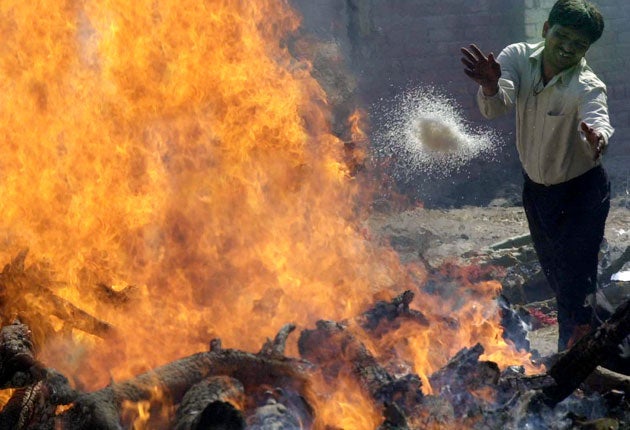It's not your funeral: guru's cremation hopes go up in smoke

Your support helps us to tell the story
From reproductive rights to climate change to Big Tech, The Independent is on the ground when the story is developing. Whether it's investigating the financials of Elon Musk's pro-Trump PAC or producing our latest documentary, 'The A Word', which shines a light on the American women fighting for reproductive rights, we know how important it is to parse out the facts from the messaging.
At such a critical moment in US history, we need reporters on the ground. Your donation allows us to keep sending journalists to speak to both sides of the story.
The Independent is trusted by Americans across the entire political spectrum. And unlike many other quality news outlets, we choose not to lock Americans out of our reporting and analysis with paywalls. We believe quality journalism should be available to everyone, paid for by those who can afford it.
Your support makes all the difference.A septuagenarian Hindu guru who wants to be cremated outdoors after he dies has vowed to continue his fight, after the High Court yesterday ruled that funeral pyres are illegal in Britain. Davender Kumar Ghai, 70, had travelled to the High Court to challenge a decision by Newcastle City Council which forbade his son Sanjay from cremating him outside.
Mr Ghai and his supporters had hoped to overturn the ruling by arguing that denying him a traditional funeral pyre contravened his right to practice religion freely under Article 9 of the European Convention on Human Rights. But Mr Justice Cranston disagreed, stating that funeral pyres are not allowed under UK law and that the prohibition was "justified".
In his ruling, the judge said: "The Cremation Act 1902 and its attendant 2008 regulations are clear in their effect: the burning of human remains, other than in a crematorium, is a criminal offence. This effectively prohibits open- air funeral pyres."
Justice Cranston gave Mr Ghai permission to appeal against the ruling, which he has vowed to do. The Ugandan-born father-of-three is also willing to go to the European Court of Human Rights if his Court of Appeal case fails.
During the test case, Mr Ghai, who is seeking medical treatment in India, told the court of his wish to "die with dignity" and not be "bundled in a box". A devout Hindu guru who has a small but committed following of supporters across the country, Mr Ghai believes his soul will be fully released from his body if he is cremated on a traditional pyre, as commonly used by Hindus across South Asia. He fears an ordinary crematorium would force his soul to mingle with others and lead to a "bad death", adversely affecting his reincarnation.
Support for Mr Ghai's cause in the wider Hindu community was initially limited, with none of the major Hindu umbrella organisations throwing their weight behind his campaign. But in recent months, most of the main representative Hindu bodies have voiced some level of support for a change in the law, or a compromise. But Mr Justice Cranston, in his summing up, observed that "typically Hindus in this country" did not share Mr Ghai's belief in open-air pyres.
Mr Ghai's supporters believe that if funeral pyres became legal in the UK, many devout British Hindus would opt for an outdoor cremation rather than a mechanised crematorium. On the phone from Delhi yesterday, Mr Ghai said he was saddened by the ruling and upset that he had not been informed that verdict was due yesterday. He vowed to appeal the decision.
"I respect the decision of the Court but, for me, this is quite literally a matter of life and death," he said. "I shall appeal until the very end, in the faith that my dying wish will not go unheard. A matter of such magnitude deserves to be heard by the highest courts in our land and I shall not tire until all legal avenues are exhausted."
During the judicial review, Newcastle City Council was also supported by the Justice Secretary Jack Straw, who suggested that those outside Britain's Hindu community would be "upset and offended" by funeral pyres and "find it abhorrent that human remains were being burnt in this way".
But Ramesh Kallidai, the secretary general of the Hindu Forum of Britain, one of the umbrella groups that supports Mr Ghai's bid, said Mr Straw's comments will have offended many Hindus. "I think that to suggest a practice which has been carried out for thousands of years and still is by 800 million Hindus in India is somehow "abhorrent" is insenstive and very unhelpful," he said. "No one, including Mr Ghai, has ever suggested doing outdoor cremations in public. They would be held in private just as the vast majority of funerals in India are."
Sacred fire: Hindu way of death
*Hindus believe the body is a temporary vessel for the soul. After death, a great deal of emphasis is placed on ensuring the soul leaves the body in the best possible way to aid its reincarnation. Hindus believe that agni, or sacred fire, is the only way to do this, but many fear that a modern crematorium leads to akal mrtyu (bad death) because the soul is forced to mingle with other deceased souls. Flying a relative's body back to South Asia for a traditional pyre is too costly for most British Hindus.
Join our commenting forum
Join thought-provoking conversations, follow other Independent readers and see their replies
Comments